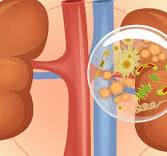Understanding Kidney Infection: Symptoms, Causes, and Treatment in Australia
by twib

Kidney Infection: Symptoms, Causes, and Treatment
A kidney infection, also known as pyelonephritis, is a serious medical condition that occurs when harmful bacteria infect one or both of your kidneys. This condition requires prompt medical attention to prevent complications and ensure a full recovery.
Symptoms of Kidney Infection
Common symptoms of a kidney infection include:
- Fever and chills
- Pain in the back or side
- Frequent urination
- Blood in the urine
- Nausea and vomiting
- Fatigue and weakness
Causes of Kidney Infection
Kidney infections usually occur when bacteria enter the urinary tract and travel up to the kidneys. Common causes include:
- Untreated urinary tract infections (UTIs)
- Blockages in the urinary tract that prevent urine from flowing normally
- Weakened immune system
- Structural issues in the urinary tract that make it easier for bacteria to thrive
Treatment for Kidney Infection
If you suspect you have a kidney infection, it’s important to see a healthcare provider promptly. Treatment typically involves:
- Antibiotics: To kill the bacteria causing the infection.
- Pain relievers: To alleviate discomfort.
- Hydration: Drinking plenty of water helps flush out bacteria.
- Rest: Giving your body time to heal is crucial.
- Follow-up care: Your doctor may recommend follow-up tests to ensure the infection has cleared.
Top 6 Tips for Preventing and Managing Kidney Infections
- Stay hydrated by drinking plenty of water
- Follow your doctor’s prescribed treatment plan
- Avoid holding in urine for long periods of time
- Maintain good hygiene to prevent the spread of bacteria
- Limit alcohol and caffeine intake
- Eat a balanced diet low in sodium and processed foods
Stay hydrated by drinking plenty of water
Staying hydrated by drinking plenty of water is a crucial tip for preventing and managing kidney infections. Adequate hydration helps to flush out harmful bacteria from the urinary tract, reducing the risk of infection spreading to the kidneys. By ensuring you drink enough water throughout the day, you can support your body’s natural defense mechanisms and promote overall kidney health. Remember, maintaining good hydration levels is a simple yet effective way to protect yourself against kidney infections.
Follow your doctor’s prescribed treatment plan
It is crucial to follow your doctor’s prescribed treatment plan when dealing with a kidney infection. Adhering to the recommended course of antibiotics and other medications, staying hydrated, getting adequate rest, and attending follow-up appointments are essential steps in ensuring the infection is properly treated and complications are avoided. Your doctor’s guidance is key to a successful recovery from a kidney infection, so it’s important to follow their instructions diligently.
Avoid holding in urine for long periods of time
It is essential to avoid holding in urine for extended periods to prevent kidney infections. When urine stays in the bladder for too long, bacteria can multiply, increasing the risk of urinary tract infections that can progress to kidney infections. It is recommended to empty the bladder regularly to help flush out bacteria and maintain urinary tract health. Prioritizing timely bathroom breaks can contribute to overall kidney health and reduce the likelihood of developing infections.
Maintain good hygiene to prevent the spread of bacteria
Maintaining good hygiene practices is essential in preventing the spread of bacteria that can lead to kidney infections. Simple habits such as washing your hands regularly, especially before and after using the bathroom, can significantly reduce the risk of bacterial contamination. Additionally, ensuring cleanliness in personal and shared spaces, such as bathrooms and kitchen areas, can help minimise the chances of bacteria entering your urinary tract and causing infections. By prioritising hygiene in your daily routine, you can take proactive steps towards safeguarding your kidney health.
Limit alcohol and caffeine intake
Limiting alcohol and caffeine intake is a beneficial tip for individuals dealing with kidney infections. Alcohol and caffeine can be dehydrating, which may exacerbate the symptoms of a kidney infection. By reducing consumption of these substances, individuals can help support their kidneys’ health and recovery process. Opting for water or herbal teas as alternative beverages can promote hydration and overall well-being while managing kidney infection symptoms effectively.
Eat a balanced diet low in sodium and processed foods
Maintaining a balanced diet that is low in sodium and processed foods is essential for kidney health. Excessive sodium intake can lead to high blood pressure and put strain on the kidneys, increasing the risk of kidney infections. By opting for fresh, whole foods and reducing processed food consumption, you can support your kidneys’ function and overall well-being. Prioritizing nutrient-dense meals rich in fruits, vegetables, lean proteins, and whole grains can help prevent kidney infections and promote optimal kidney health.
Kidney Infection: Symptoms, Causes, and Treatment Kidney Infection: Symptoms, Causes, and Treatment A kidney infection, also known as pyelonephritis, is a serious medical condition that occurs when harmful bacteria infect one or both of your kidneys. This condition requires prompt medical attention to prevent complications and ensure a full recovery. Symptoms of Kidney Infection Common…
Latest articles
Latest comments
Archive
- March 2026
- February 2026
- January 2026
- December 2025
- November 2025
- October 2025
- September 2025
- August 2025
- July 2025
- June 2025
- May 2025
- April 2025
- March 2025
- February 2025
- January 2025
- December 2024
- November 2024
- October 2024
- September 2024
- August 2024
- July 2024
- June 2024
- May 2024
- April 2024
- March 2024
